How to Test Your Adrenal Function
Your adrenal function is critical to help us adapt to stress and heal. When the adrenals are out of balance, it affects our energy, sleep, mental focus and hormone balance. Over time, we can develop a condition called HPA axis dysfunction, or adrenal fatigue, in which our adrenal glands are not adapting properly to the demands of the environment.
The adrenals are coordinated by regions of the brain called the hypothalamus and the pituitary gland. The hypothalamus has an antenna like effect in which it is constantly checking the blood stream for any signs of stress.
When it notices changes (such as breathing changes) it sends signals to the pituitary gland and the sympathetic nervous system which then activate the adrenals. This connection process is called the hypothalamic-pituitary-adrenal (HPA) axis.
When the body is under chronic stress it creates a communication breakdown in the HPA axis leading to both adrenal overactivity and underactivity (1, 2).
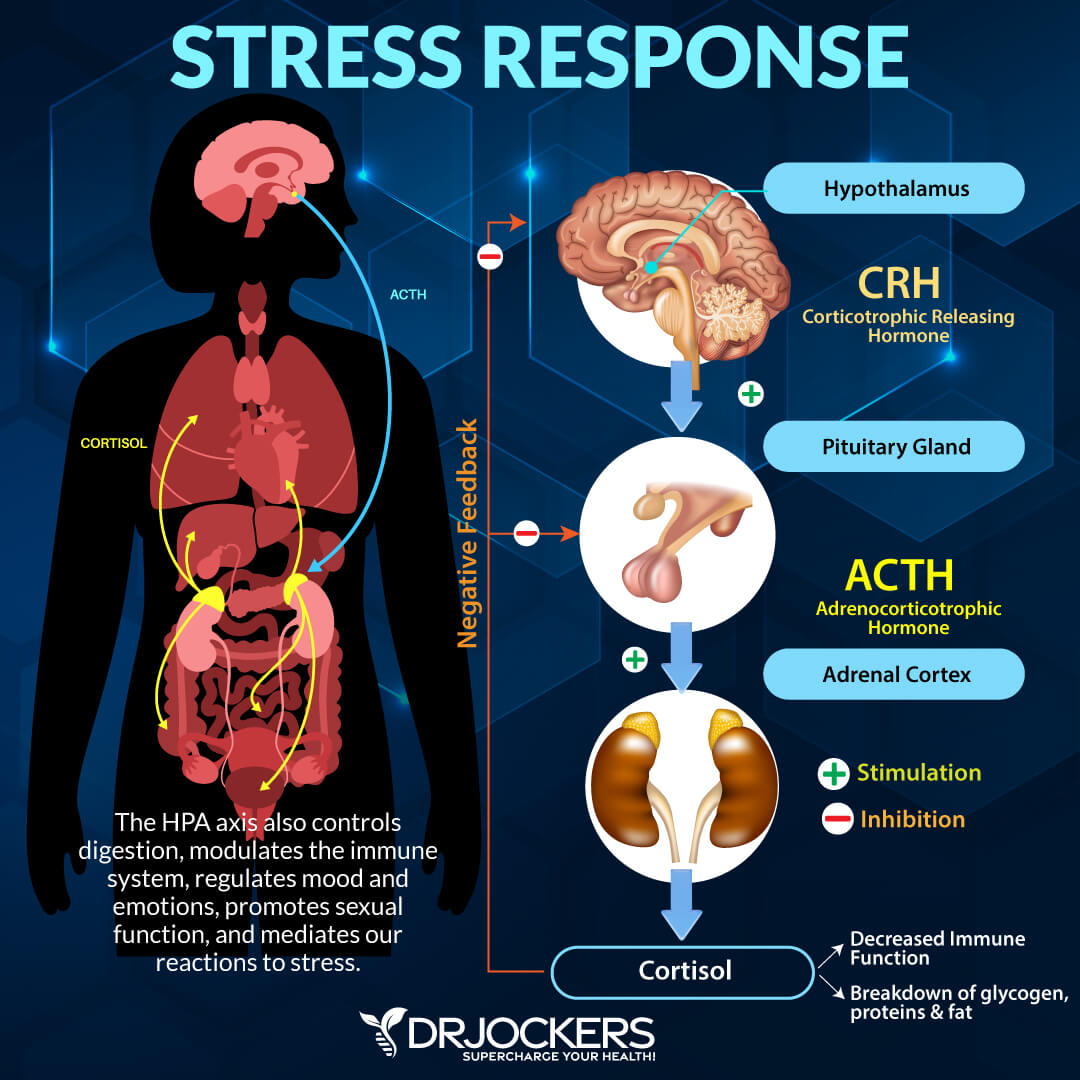
Overactive Vs Underactive Adrenals:
Depending upon the individual and how they uniquely handle chronic stress and how long the individual has dealt with stress, they will experience HPA Axis dysfunction in different ways. We put these in 2 major categories:
- Adrenal Hyperfunction: Overactivity of adrenal output
- Adrenal Hypofunction: Underactivity of adrenal output
When the adrenal function is overactive, we produce too much cortisol, epinephrine, norepinephrine and often times aldosterone. Cortisol plays a role in elevated blood sugar, so individuals with adrenal hyperfunction will often have increased blood sugar levels. This may eventually lead to insulin resistance and diabetes (3).
In the case of underactive adrenals, they produce too little cortisol to maintain normal bodily homeostasis (4). This often results in hypoglycemic reactions and increased inflammation as cortisol is unable to control blood sugar and the inflammatory response.
When cortisol levels drop, the adrenals will release epinephrine which causes a stronger stress response than cortisol. The release of high amounts of epinephrine can cause lightheadedness, dizziness, heart palpitations and irritability. This is what people with hypoglycemia experience. This often happens at night and causes the individual to wake up in the middle of the night and not be able to fall back asleep.
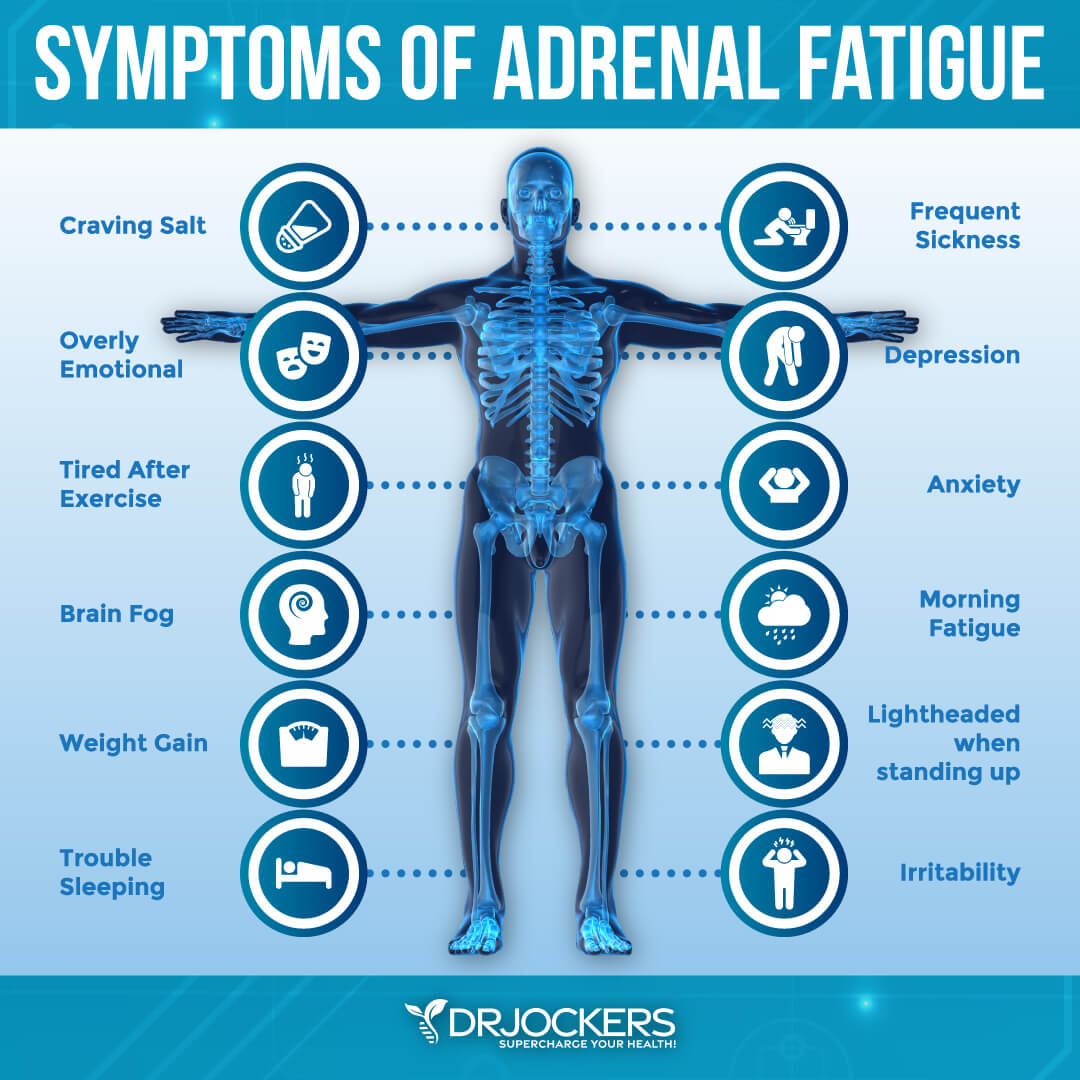
Testing Adrenal Function:
The gold standard test is called an adrenal function is the DUTCH or Dried Urine Test for Comprehensive Hormones. This test charts out the levels of cortisol and DHEA throughout the day. This test looks at both free cortisol and cortisol metabolites to see how the body is breaking down the cortisol. Cortisol should naturally be high in the morning and slowly go down to its lowest levels at night.
Many individuals with poor adrenal function have disproportionate cortisol slopes with elevated cortisol in the evening. This can cause poor sleep and anxiety at night. When I look at the adrenals, I also like to see estrogen, progesterone and testosterone levels which helps us shape out what is happening with the overall adrenal function.
The challenge with the DUTCH is that it costs around $350 and is rarely ever covered by insurance. Additionally, most mainstream medical doctors have never been trained in the analysis of this test.
They usually just run a standard blood cortisol test that only looks at cortisol at one time during the day. The key is to look at the cortisol rhythm and metabolism not just one cortisol metabolite at one period of time, which can be all over the place depending upon the time of day.

The DUTCH Test
Precision Analytical labs developed this unique test. It measures your hormone metabolites from dried urine samples. The hormones include:
- Cortisol
- Cortisone
- Estradiol
- Estrone
- Estriol
- Progesterone
- Testosterone
- DHEA
- Melatonin
This test also measures your cortisol and cortisone rhythms and levels, and your estrogen metabolism pathways.
Additionally, it looks at 8-OHdG which is a marker of oxidative stress and it looks at several key neurotransmitter metabolites that view dopamine, norepinephrine and serotonin production. It also looks at several markers for B vitamin status.
At Home Tests For Poor Adrenal Function
There are many different clinical signs for poor adrenal function that can be found through both at home and standard laboratory testing. Here are a few tests you can do at home to get a self-analysis of the health of your HPA axis.
1. Blood Pressure:
The adrenals play a big role in helping to maintain normal blood pressure levels. A normal resting blood pressure should be in the range of 110–130 mm/Hg systolic over 70–80 mm/Hg Diastolic. Individuals with adrenal hyperfunction (high stress hormones) will have high blood pressure while individuals with adrenal hypofunction (low stress hormones) will have low blood pressure.
A resting blood pressure over 130/80 mm/Hg can be a sign of high adrenal output. A resting blood pressure under 110/70 mm/Hg may be a sign of low adrenal output.
2. Orthostatic Hypotension Test:
All you need for this one is a blood pressure cuff. Lie down for 5 minutes and then take your blood pressure and make note of it (especially the systolic – top number). Then stand up and take your blood pressure again immediately.
The systolic pressure should naturally rise about 10 mm/hg when you go from sitting to standing. If the systolic pressure remained the same or it decreased, there is a chance you have adrenal fatigue. When we stand, epinephrine is normally secreted to increase the blood pressure to overcome gravity and pump blood towards the heart.
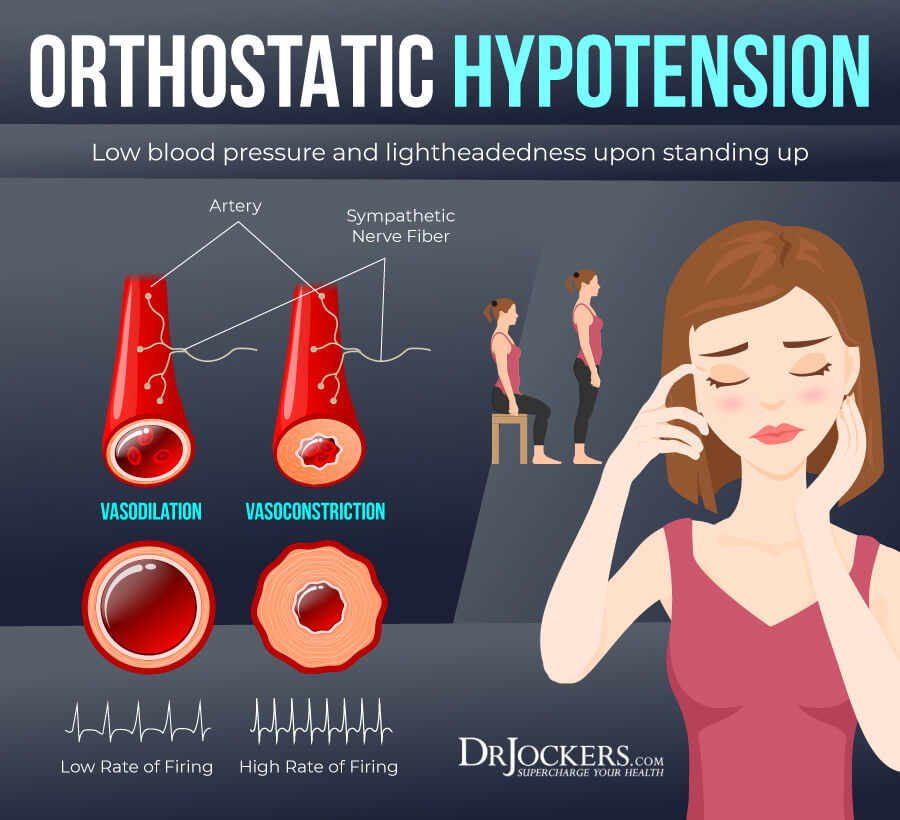
3. Pupillary Constriction Test:
This test was first described in 1924 by Dr. Arroyo. It measures the contraction of the iris in response to dark light exposure. The hypothalamic-pituitary-adrenal (HPA) axis helps to control the contraction of the iris.
When someone is dealing with adrenal fatigue, they are unable to maintain the contraction for a normal length of time. Here is how you do the test.
- Set up the Room: Sit in front of a mirror in a dimly lit room.
- Use a Flashlight: Take a flashlight and shine it into your eye from the side of your face (45 degree angle). When this happens, your eyes will naturally constrict and the diameter will reduce in size. Here are the possible results:
Pupillary Response: Possible Finding:
Stays constricted for 20+ seconds Healthy HPA Axis
Fasciculates between 10–20 seconds Mild HPA Axis disruption
Fasciculates between 5–10 seconds HPA Axis Fatigue
Immediate pulsation and dilation HPA Axis Exhaustion/Failure
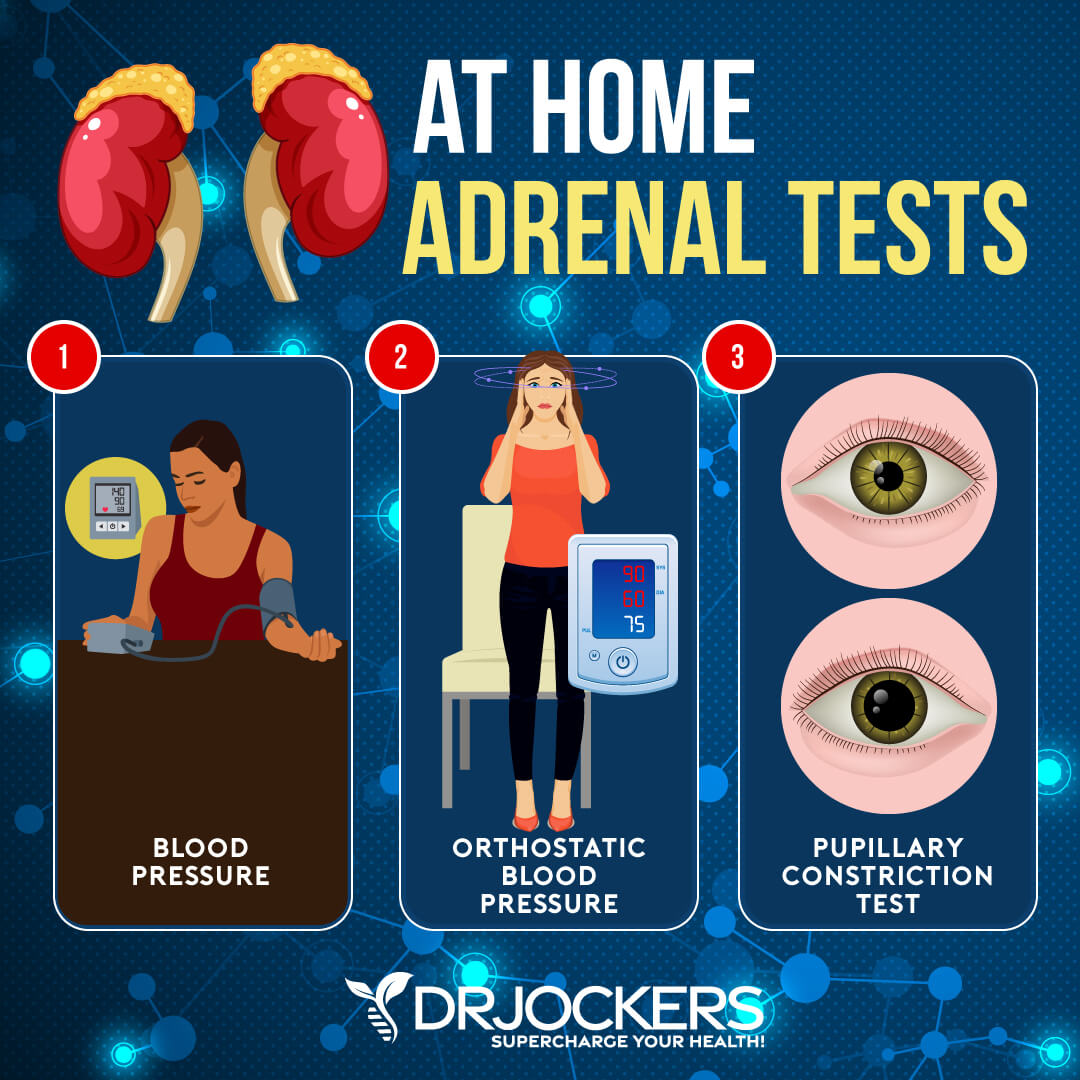
Blood Tests for Adrenal Function:
Standard and inexpensive blood work can provide a lot of important information regarding one’s health if it is interpreted correctly. A functional blood chemistry evaluation takes into account a number of individualized factors that help to give an understanding of the individual’s health in regards to the complex connections between the various systems of the body.
Simple and inexpensive tests such as a complete blood count and comprehensive metabolic panel can identify dysfunctions in the kidneys, liver, gut and adrenals. Insurance companies will pay for these tests at your primary care provider.
I personally have these tests available within my Comprehensive Blood Analysis package that also looks at vitamin D, C reactive protein, homocysteine, full thyroid panel including antibodies and much more. This is the most common lab I recommend. You can check that out here.
High Adrenal Function:
This form of adrenal function is characterized by an excess of cortisol and stress hormones. In addition, this will result in high aldosterone levels, which causes sodium chloride retention and potassium dumping.
High aldosterone levels will cause hypertension and can also contribute to symptoms such as anxiety, irritability, and headaches.
On a comprehensive metabolic panel, you will see a level for sodium, chloride, and potassium. This is key to understanding what is happening with the adrenals.
Sodium:
Sodium should normally be between 140–145 mmol/L. With adrenal hyperfunction, sodium will be in the high normal or above. So anything 144+, I start to consider adrenal hyperfunction.
Potassium:
This should normally between 4.0–4.5 mmol/L. When it is low, 4.0 or under, it is a strong consideration for adrenal hyperfunction.
Chloride:
This is a component of sodium–sodium chloride and is retained in adrenal hyperfunction. Normal levels should be between 100–106 mmol/L. When chloride levels are over 105 mmol/L, it is a sign of adrenal hyperfunction.
The end result of this is metabolic acidosis which is often seen with hypertension and anxiety.
Carbon Dioxide:
The levels are usually low – under 23, which is a sign of blood sugar dysregulation
High Blood Glucose:
Most people with adrenal hyperfunction have elevated fasting blood glucose and HbA1C because these individuals have high cortisol (which elevated blood sugar) and high stress hormones (or low) leads to insulin resistance and poor blood sugar control.
High Cholesterol:
Individuals with adrenal hyperfunction will often have high cholesterol and the terrible triad of high LDL, low HDL, and high triglycerides.
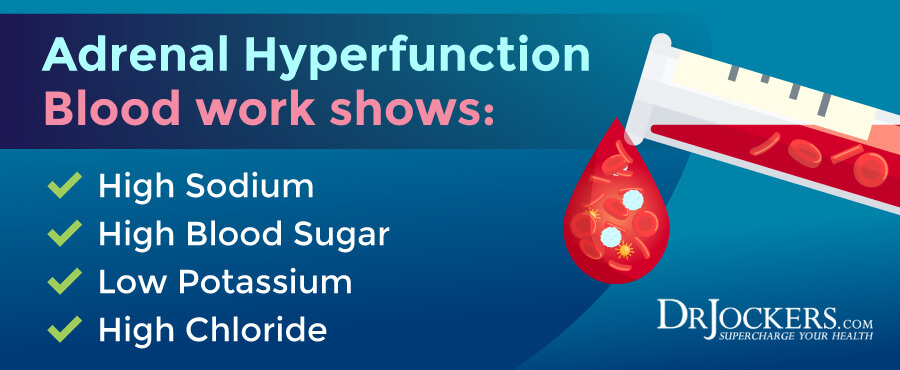
Low Adrenal Function:
This condition is a sign of low cortisol, stress hormones, and aldosterone levels. This will lead to lower sodium and chloride levels and higher potassium levels. It will also result in low blood pressure, dizziness, fatigue, and hypothyroid type of problems.
Sodium:
Because aldosterone is low, the body will not retain sodium. You will see that the levels will be 140 or less.
Potassium:
Aldosterone helps to keep sodium/potassium balance so with low sodium, there will typically be high potassium. The levels will be higher at 4.4 or above
Chloride:
Aldosterone works to maintain chloride levels so they will be low. The levels would be under 100.
When there is high potassium and low sodium, it causes a state of metabolic alkalosis. This can be just as problematic as metabolic acidosis and is just as common as acidosis, if not more.
Classic signs that are usually seen together include low blood pressure, hypothyroid, and metabolic alkalosis.
Carbon Dioxide:
This is usually low – under 23, due to the poor blood sugar regulation
Low Blood Sugar:
Because the individual has low cortisol levels they will typically show a low fasting blood glucose level (under 80 mg/dl) but normal to high HbA1C because they also deal with insulin resistance due to poor blood sugar control.
Low Cholesterol:
Individuals with adrenal hypofunction may have low total cholesterol and very high HDL in proportion to LDL.
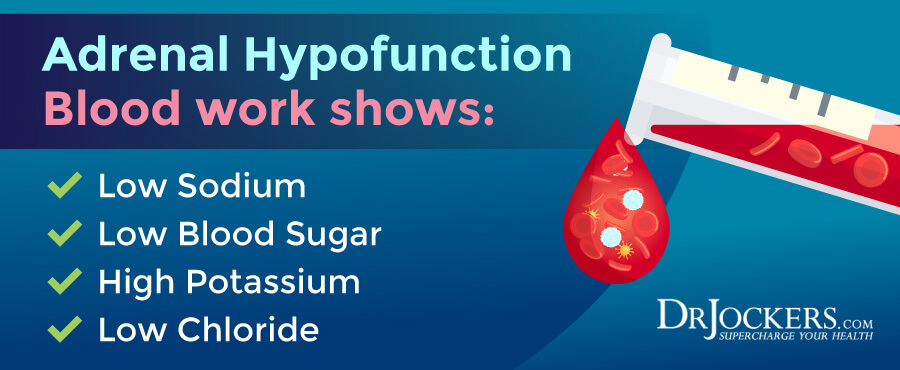
Adrenal Function and Electrolyte Balance:
We all have mineral salts in the form of sodium, potassium chloride, sulfate, magnesium, calcium, and phosphate that help to control the electrical charge and water flow around cells.
The most important ratio for fluid and electrolyte dynamics is the sodium: potassium ratio. This plays a role in blood pressure, nervous system activity, energy utilization, and more. When the body has excess adrenal activity, there will be too much sodium and low potassium and low adrenal activity will lead to low sodium and high potassium.
Using minerals can be very important for balancing adrenal function. Many people are chronically dehydrated despite drinking a lot of water because they have mineral imbalances. We know that soil depletion has removed a significant amount of minerals such as magnesium from our food than in years past.
The minerals in typical table salts are poorly absorbed and most people are eating very little mineral rich foods throughout the day. In addition, many people have low stomach acid and other digestive disturbances that lead to poor mineral absorption.
Most people with adrenal hypofunction will have low sodium and chloride levels and will crave salts in order to help balance this. Make sure they are consuming mineral rich foods and good quality sea salts, Himalayan sea salt in particular.
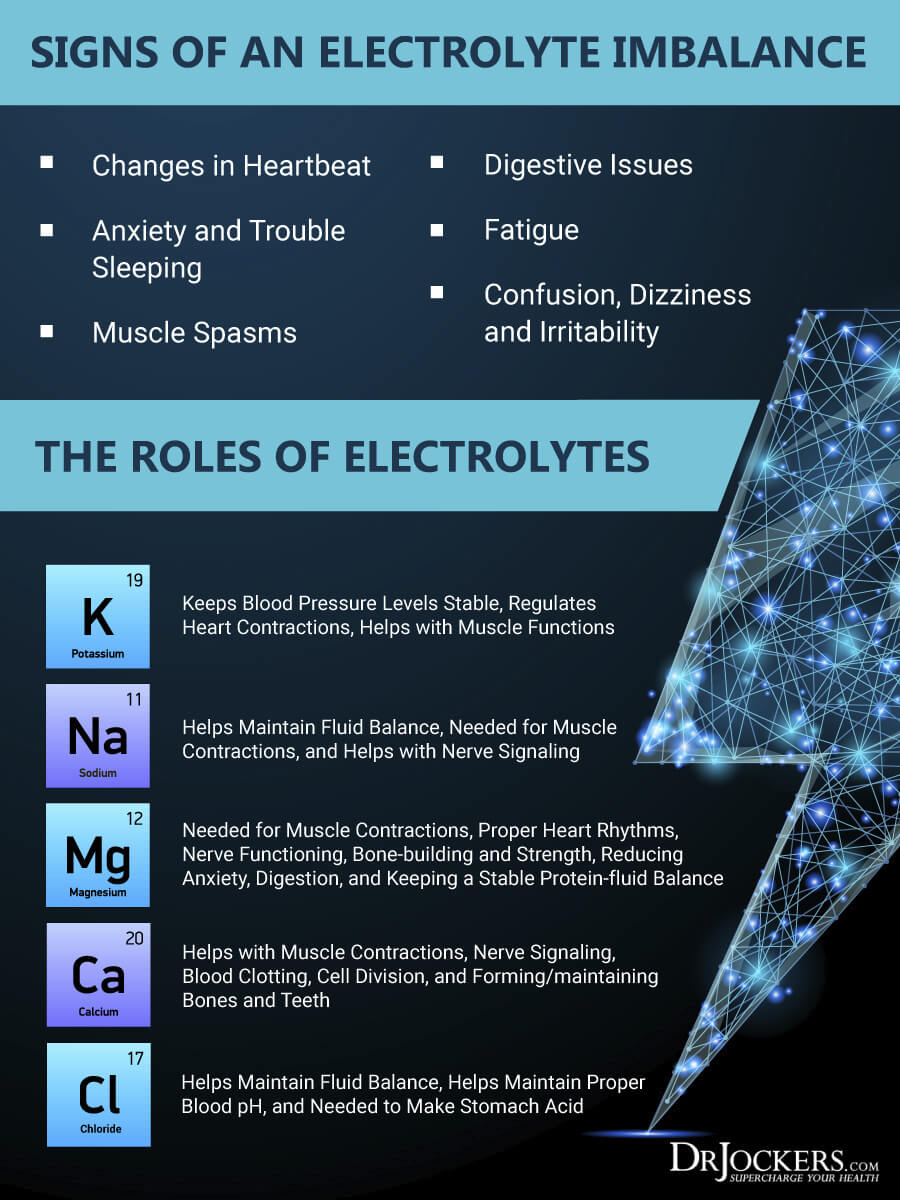
Adrenal Function Summary:
There are many ways you can study the health of your adrenals. You can try the 3 at home tests to determine the status of your HPA axis. You can also look at very inexpensive and standard lab work for signs. Finally, you can purchase and do a salivary adrenal cortisol test to look at your cortisol and DHEA levels throughout the day.
If you have an adrenal problem or want to prevent an adrenal problem, then I would suggest following as many of the strategies I discuss in this article.
If you want to work with a functional health coach, I recommend this article with tips on how to find a great coach. Our website offers long-distance functional health coaching programs. For further support with your health goals, just reach out and our fantastic coaches are here to support your journey.
Inflammation Crushing Ebundle
The Inflammation Crushing Ebundle is designed to help you improve your brain, liver, immune system and discover the healing strategies, foods and recipes to burn fat, reduce inflammation and Thrive in Life!
As a doctor of natural medicine, I have spent the past 20 years studying the best healing strategies and worked with hundreds of coaching clients, helping them overcome chronic health conditions and optimize their overall health.
In our Inflammation Crushing Ebundle, I have put together my very best strategies to reduce inflammation and optimize your healing potential. Take a look at what you will get inside these valuable guides below!
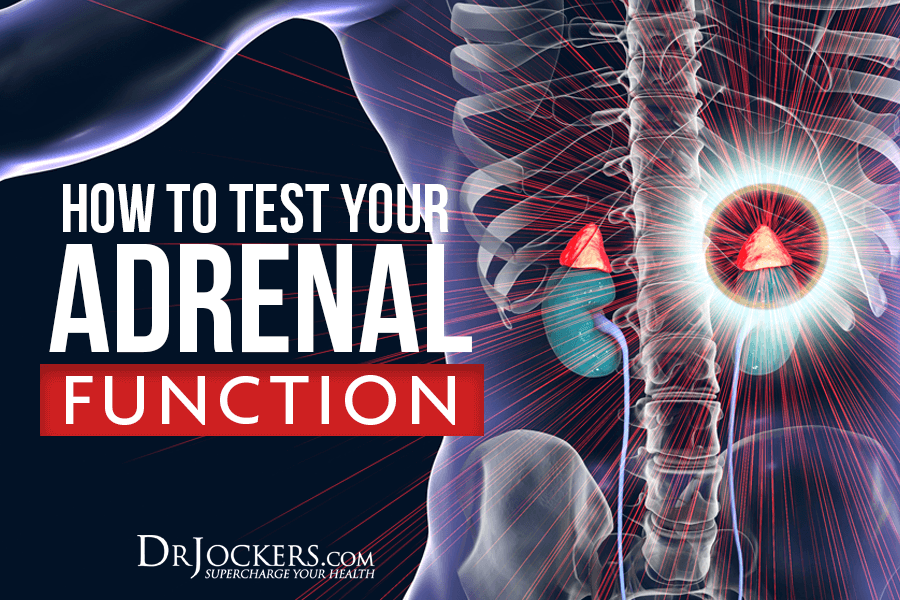


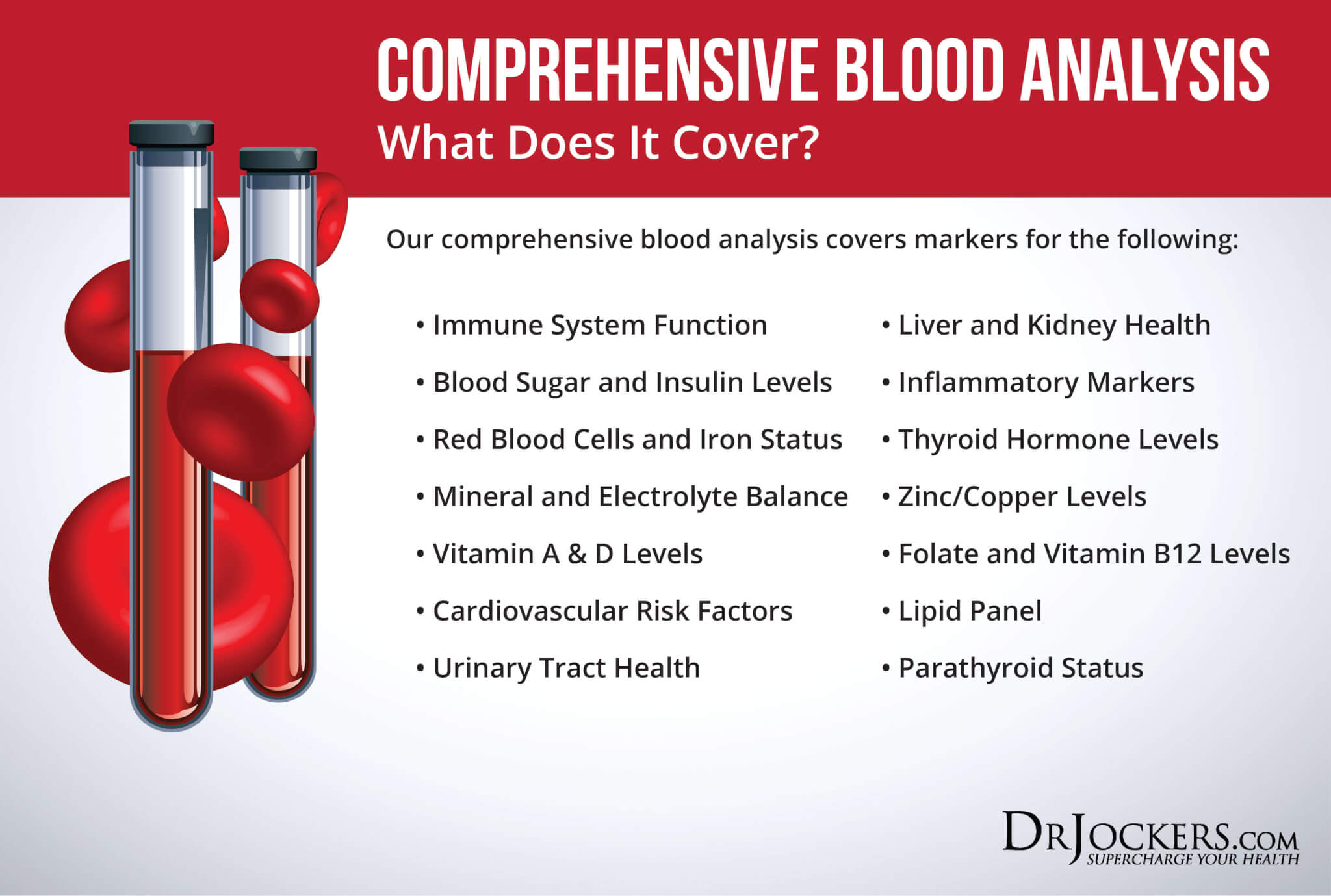




I have no adrenal glands and exist on steroids hydrocortozone and Fludrocortozone, Not the same guys. any suggestions???
So sorry to hear about this Ray! I have never worked with anyone that dosn’t have adrenal glands, so glad modern medicine has been able to help you. I would recommend following these strategies as well. https://drjockers.com/25-lifestyle-strategies-to-heal-adrenal-fatigue-naturally/
Hello Dr Jockers
thanks for this very infomative
my son has Pathological demand avoidance – characterised by feeling every thing is a demand ie getting dressed having a drink the most basic things no matter how presented is perceived as a demand then resistance begins it may be a small resistance like joking about or changing the subject or just a flat out ignore until it builds up into a full blown panic attack. the PDA society say it’s extreme anxiety.
As you can imagine especially as he ages it is very difficult for him to manage.
I am commited to getting to the root cause I don’t just buy a label and suck it it mum I believe SOMETHING doesn’t work correctly, the closest answer I may have is adrenal fatigue we are dairy free and low grain we eat well organic where we can and so on.
I am looking to adrenal fatigue and trying to read as much as I can before we tackle it.
any thoughts are welcomed thanks!
Sorry to hear about this! I would suggest adding in probiotics and magnesium and going on a lower carb (gluten free), no sugar, nutrient dense diet!
Good day from Oronadl!! I’m just weary (blank) (blank) in labor so I made a decision to check out your blog on my mobile phone while in lunch time. I really enjoy the knowledge you offer here and also can not wait to take a look when I go back home. I am just amazed at how fast your web site loaded on my cell phone .. I’m not even using Wireless, simply 3G .. Anyways, excellent blog site!
Glad to hear it Lolly!
Try reading Dr. William Walsh’s book NUTRIENT POWER. Found out my grandson has krptopyrolle….which is easily remediated. After reading the book you can look up Dr. Albert Mensah. He is a doc that follows this protocol to uncover the root cause.
Yes, we have studied that book and work with these cases as well. https://drjockers.com/pyroluria-common-unknown-disorder/
My son is 18 months old and suffered from day one with acid reflux. He got severe nappy rash that looked like a burn and was in horrendous pain. He was diagnosed with cows milk protein allergy but nothing got better. To cut to the chase he has been in and out of hospital ever since with numerous infections and pneumonia and once he gets an infection its open season and he gets everything! He has dry skin and is very sensitive to sunlight. I’m certain he has headaches , his legs buckle underneath him frequently and he had a hypoglycemic attack with a blood sugar level of 2.5. a random cortisol reading showed a reading of 182 so on Monday he is having a synathix test (sorry for spelling). He drinks a ridiculous amount and can have 3 bottles from 10pm – 7am. He gets irritable and can have a wicked temper but to look at him he looks a healthy beautiful boy. Hes ether really well or really poorly there’s no in between and he still has prolonged and frequent bouts of acid reflux (he had a pH study at 10 months) does all this sound like adrenal issues to u? I just want to help him and I’m looking for some expert advice!
Hey Amy,
I’m so sorry to hear about all this! I would definitely recommend finding a pediatric chiropractor in your area: https://icpa4kids.com/
I am 58 and started having trouble with my heart rate going up from 60 to 135+ in seconds when watching TV at night. Which in turn causes my blood pressure to raise and I start sweating badly have a very sick feeling in my stomach as well.
Went to ER several times and in hospital twice. They never find anything.
The second stay at the hospital I had a allergic reaction to toperal. ( stroke like symptoms) I’ve had ever heart test you can have except angiogram twice in addition to 2 MRI’s of my brain and everything is normal. Praise God. Only very mild mitro valve prolapse with no leakage.
Now I am on Cartizem 120. It seems though it is controlling symptoms but I still have episodes that my heart rate now only goes up to like 95 and starts going down within a few mins I start sweating but feel as bad as I did before.
In the past I found out I have hypothyroid in 2013. And just resenly got kinda regulated. With 75mg of meds. But they have tested my thyroid and said it’s fine. I do have PVC’s since the thyroid issues.
I resently had a Loop Recorder inserted into my chest. And again Praise God they haven’t found anything.
So any suggestions would be wonderful or am I just getting old and I’m also out of shape and need to loss about 40 pounds.
I’m sorry to hear about all that is going on Darlene! This could be a combination of factors in the body, I would recommend emailing nutrition@drjockers.com to dive deeper into this!
Start taking a standardized Hawthorne supplement. Look for one that is Standardized and take in the evening before bedtime. It could also be taken in the morning. Depends on when you notice the most heart racing. Mine used to wake me up during the night, so I took the Hawthorne in the evening and that helped regulate the beats. Just make sure you take the Hawthorne daily – when I miss a day I notice the racing heart or skipped beats returning. Hawthorne is an excellent “tonic” for the heart and will not harm you if it is not “needed”. It helps strengthen the heart muscles in a good way. God bless.
Hi there I can’t sleep I am exhausted all day drink coffee I also have low T3 my hair is dry I’ve lost over half of my brows every Doc wants to put me on birth control and syas it’s perimeno ugggg
Carla 44
Since adrenals and thyroid health are so closely linked, please check into getting a (more) complete thyroid panel blood test. You may have to tell the doctor that you’re just curious about the numbers in some tests so they will order them but really, it’s crucial to get rT3, free T3, freeT4 among other tests. Then study why. Stop the thyroid madness is a good site but you can google rT3 and get great info about determining your TRUE thyroid health with the info from these blood tests.
Yes we offer a very in-depth thyroid panel here that takes all of these measurements and more: https://drjockers.com/complete-thyroid-report/%20
I would suggest working with one of our coaches Carla!
Thank you for this very generous article! I feel better armed to help my 12-year-old daughter, whom I suspect has adrenal fatigue.
Great to hear Christine!
46 year old male active/athletic (cyclist)
Over the last couple of months I’ve begun to have internal tremors in the upper back, neck and head mostly at night but now often through out the day as well.. I’ve always had a bit of anxiety that’s been manageable but now it’s in overdrive with concern over this. Your article and other research has me curious if it may be caused by a potential adrenal issue.
My recent CBC / Electrolyte results:
Potassium: 3.4
Sodium: 135
Chloride: 98
Can you give me your thoughts as it appears that both potassium and sodium are low confusing me on which if any adrenal issue it could be hypo or hyper??
Thanks Greatly!
Aaron Joseph
You would need to test your cortisol rhythm Aaron. It would also be helpful to test your thyroid numbers. Here are two good tests:
https://drjockers.com/complete-thyroid-report/%20
https://drjockers.com/the-dutch-complete-hormone-panel/
Sounds like I have hypo adrenal function. Low blood pressure that falls 20 points when I stand up (often I go blind for a few seconds as a result), pupils that do not hold construction, waking up in the night. The low chloride and sodium associated with this makes me wonder if that may be contributing to the low stomach acid I also have?
I wonder if it’s because I under eat? My family only buys junk food and I try to avoid it and eat the healthy things I buy. Probably have low blood sugar a lot of the time… I notice I don’t go blind when I’ve been eating enough carbs, yet my blood pressure still drops 20. (110 to 90 I didn’t go blind, but sometimes I’m already at 90). I’m not sure how to fix this… eating more salt? Just eating more, period? I do need to do that anyway, but I wonder if it’s the root of these problems.
It could be related to a number of things Claire! This could also be a thyroid-related issue. I would highly recommend having this lab done and connecting with one of our functional nutrition coaches: https://drjockers.com/complete-thyroid-report/%20
How can I tell if my low cortisol levels are from adrenal fatigue or Addison’s disease?
You can get an adrenal anti-body test to see if you have adrenal autoimmunity which would cause Addison’s disease
I have been having symptoms of pregnancy tender breast nausea fatigue bloating cramps in lower adomon mood swings tight feeling around my uterus my estrogen is high I have hypothyroid my blood sugar levels are normal blood pressure is normal I sleep good unless I get alot of gas or get up to pee. I wake up at 7 am every morning with no problem I’m moody my pregnancy test are negitive I am pre menopausal and I am cold all the time I’m not week or have thin arms and legs my doctor thinks that I have adrenal problems I’m not sure if I do
Sorry to hear that! I would recommend working with a functional health practitioner. Here is a helpful article: https://drjockers.com/functional-nutrition-tips-to-find-a-great-health-coach/
I have hyperadrenergic POTS…when I stand my blood pressure and heart rate increase dramatically which makes me feel ill. Once I sit I start recovering. I’ve also had my plasma epinephrine tested while standing and it’s always twice the normal range, although my 24 hour urine epinephrine test is okay. I’ve just started seeing a cardiologist and it seems the common fix are prescriptions to slow down the heart rate and lower blood pressure, but I’d much prefer something that better controls my increased epinephrine since that seems to be the source of my high blood pressure and heart rate. Is there something you could recommend or some specific testing that might reveal the real source of my illness? Thank you!
What type of specialist tests and treats adrenal fatigue? I have all of the symptoms, and I’m tired of having my general physician tell me I just need to lose weight. I had gastric bypass nine years ago and lost down to a size four. I’m back to a size 18, zero energy, massive sleep issues, and my food portions are half what everyone else eats. I have dry skin, dry hair, ridges on the surface of my nails, and menopausal. I could go on and on. I need to go to a specialist in my area, but don’t know what type of doctor to look for.
Yes sorry to hear about this! You will want to work with a functional health practitioner. Here is a helpful article on how to find one: https://drjockers.com/functional-nutrition-tips-to-find-a-great-health-coach/
Dr. Jockers,
I am from Canada.
Can I still access your thyroid , adrenal and hormone tests ?
Yes you can do all the at home tests we discussed in these articles.
Hello Dr Jockers, I’m sure I have adrenal fatigue, but wondered if nodules were anything to worry about? I used to have yearly ultrasounds but that stopped as my Endo didn’t think it was necessary to carry on as they remained stable. Do you have an opinion on that?
Thank you.
Yes nodules are a sign of inflammation and typically autoimmunity associated with the organ tissue and can cause major dysfunction in the area if the immune response is not reduced.
I had panic attack,anxiety,digestion issue and dizziness. My bloodwork show my thyroid TSH is low and i did carnivore diet since june 1st. What i beed to do to heal my adrenal?
I’m wondering if testing adrenal is a good idea after trying to stabilize thyroid for over a year and a half. Thyroid readings out of control even with increasing meds (compounded T3/T4 combo). All three: TSH, Total T3 and Free T4 can fluctuate out of range even with increased meds. None of it makes sense as the numbers go up and down and we test every 6 weeks to try to get this stable. Many symptoms of hypoT are there and I am so tired of dealing with this. Same is happening with my daughter. Doctors are wanting to switch meds and have now put me on Tirosint as I refused medications that are full of fillers. I have no idea what adrenal and thyroid disfunction compare but am wondering if a testing for adrenal function would help. My doctor is not so much for these things and said we’d need to go to a specialist to do this. Thoughts? Thank you
Sorry to hear about this! I would suggest working with one of our functional health coaches to get to the root cause: https://drjockers.lpages.co/long-distance-coaching-dr-jockers/